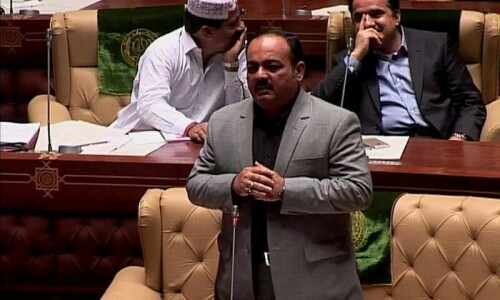KARACHI: The Muttahida Qaumi Movement-Pakistan (MQM-P), insisting that Karachi’s population is around 35 million, has appealed to all the ethnic groups living in the metropolis to take to the street against “injustice with them by resorting to unfair digital census.”
MQM-P convener Khaliq Maqbool Siddiqui on Thursday said it was a “national consensus” that under this unfair digital census the actual population of the city could never be counted.
While the census in Karachi, like other parts of the country, is continuing, the key partner of the Pakistan Democratic Movement (PDM) government at the Centre still sounds dissatisfied. It warned that it would not accept any “manipulated number” of the city population.
Addressing a press conference at the party’s temporary headquarters in Bahadurabad, Dr Siddiqui also referred to “serious flaws” in the design of the digital census which suggested “ill intention” of the authorities from the day one. He also questioned the role of parties criticising the digital census, saying that practically they were “doing only politics” as they were making no credible practical moves.
“How can one justify the higher number of blocks, set for the digital census, in rural Sindh than in Karachi and other urban areas of the province?” he argued. “Then in Karachi and Hyderabad, one block represents a total of 187 households but in rural Sindh a single block represents 250 households. In a rough calculation, more than five million population of Karachi has been compromised through this design. This is absolutely unjust and unfair count of population.”
The MQM-P leader said that before 1970s, the total population of Hyderabad and Sukkur was not even 40 percent of the Karachi’s population. After the 1970s, he added, the city witnessed a “massive influx” of people due to different local, regional and economic issues.
“Can this be possible that after facing such an influx and immigration of people from different parts of the country and neighbouring countries, the city population started declining? Now we firmly believe that there’s a national consensus that population of Karachi could not be counted correctly under this design of digital census,” he said.
Dr Siddiqui said that it was MQM-P which pushed the authorities to go for another census after serious flaws in the National Census 2017 and if the numbers of urban areas of Sindh are “manipulated through “maneuvering”, then his party would put up a stiff resistance.
Criticising those who, according to him, “are doing politics only for point scoring,” he said that mere lip-service would not help Karachiites.
“Only placing banners for ‘rights of Karachi’ and ‘true population count’ won’t work,” he said. “It demands consistent struggle and political commitment. I appeal to all the ethnic entities living in Karachi to come out of their homes. This injustice in the name of census is not against any single community. It’s against everyone living in Karachi. This is even worse than [what was done before the] East Pakistan debacle.”
He questioned the entire census exercise saying that the National Database and Registration Authority (Nadra) had issued computerised national identity cards (CNICs) and Form B to around 19.1 million people who had mentioned Karachi as their place of residence.
“This means around 19.1 million people are registered with Nadra having Karachi addresses in their CNICs and Form B. This is only data of residents of the metropolis. In addition, hundreds of thousands of people are living here but their place of residence mentioned on their CNICs is other than Karachi,” he said.
Published in Dawn, April 21st, 2023













































Dear visitor, the comments section is undergoing an overhaul and will return soon.